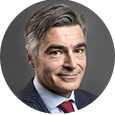The Port and City of Rotterdam – ‘Era of Transition’

1 March 2016

3.00pm – 5.00pm. Registration from 2.30pm, seated by 3.00pm

MND Auditorium
Organised by:
The Embassy of the Kingdom of the Netherlands
Centre for Liveable Cities (CLC)
Maritime and Port Authority of Singapore Academy (MPAA)
Resources
Lecture Poster (PDF: 399KB)
Lecture Report (PDF: 1.23KB)
Lecture Transcript (PDF: 986KB)Lecture Videos
Adriaan Visser: A circular economy from
redeveloping old port sites Adriaan Visser: Outcomes from the
2007 Rotterdam Climate Initiative Allard Castelein: A “green roundabout” for
industrial residual heat to reach residences Allard Castelein: Looking for the Airbnb
and Uber of transportation and logistics” How support arose for the port’s innovation
investments and the circular economy? Roles of the port authority
Synopsis
As the port industry transits towards a sustainable, bio-based, circular economy, the Port of Rotterdam is taking a leading role in the development of LNG, biofuels and renewable energy In collaboration with companies, universities and knowledge institutes. Maasvlakte 2 is an example of how a port can be developed as a green and sustainable frontrunner; companies located at Maasvlakte 2 are stimulated to make use of each other’s waste products, and residual heat is used for greenhouses in the region.
Riding on urbanisation, the municipality of Rotterdam adopts the circular economy principle by redeveloping former warehouses and shipyards into new business parks and facilities in the city area, which provide vibrant spaces for innovative companies, knowledge-institutes and universities. Sustainability is an important aspect in the reuse of these buildings.
Vice Mayor Adriaan Visser and Port of Rotterdam President Allard Castelein will share their insights on creating a port that is considerate towards the liveability for the region and adaptable to the current transition of the chemical and energy landscape. The lecture is organised by Centre for Liveable Cities, Maritime and Port Authority of Singapore Academy and the Embassy of the Kingdom of the Netherlands.
Lecture Report
Imagine a port that’s powered by renewable energy where residual heat is redistributed to nearby homes in a “green roundabout”. Or a port authority that invests in innovation as part of its mandate, even if it means making the very notion of ports obsolete in the future. The City of Rotterdam is doing precisely that, by embracing the circular economy and expanding the port’s mandate to include innovation investments and community building.
Circular Economy and the Re-Development of the City Ports in Rotterdam
Addressing CLC’s audience in a lecture co-organised with the Singapore Maritime and Port Authority (MPA) and Embassy of the Netherlands in Singapore, Rotterdam’s Vice Mayor Adriaan Visser, described the Dutch city’s working class background, and how, by the middle of the last century, ships became too large to sail on the river. Ports in the city fell in their importance and Rotterdam began building new ports — such as Maasvlakte, and the upcoming Maasvlakte 2.
Mr Visser said a key factor distinguishing ports of the past and that of the future is climate change. Rotterdam is focused on the circular economy — moving from a linear production line (“make, supply, dispose”) to an approach that is one of long-term use with minimal waste and pollution (“think, make, supply, reuse”).
“Sustainability no longer is a choice. The choice is in the question of how we are going to become more sustainable.”
— Adriaan Visser, Vice Mayor of Rotterdam
Old city ports that are disused are making way for things like Rotterdam Innovation District, where companies work with institutions of learning on innovation projects; and the city provides physical space and fiscal support. This attracts companies, financiers, learning institutes as well as young creatives to the city.
Sustainable and Adaptable Port — Transitions in Energy and Logistics
Allard Castelein, President Port of Rotterdam, characterised the future of ports alongside two key transitions — in energy use and logistics.
“I feel that it’s important that we take a first step in order to start moving. Otherwise, we can continue to analyse till, as the English would say, ‘the cows come home.’”
— Allard Castelein, President, Port of Rotterdam
While it is hard to remove fossil fuels from day-to-day use, his organisation wants to make such refineries “leaner and greener”. Some examples include steampipes for transferring residual heat for industry, household and greenhouses; and also carbon capture and storage for further reuse.
In renewable energy, Rotterdam is commissioning offshore wind in the North Sea bordering Dutch ports, where there is a high level of wind reliability. Conversely, it is working to decommission offshore platforms for oil and gas.
In logistics, by using data, smart apps, and strengthening value chains to cut inefficiencies, some industries could have a new lease of life. “We are looking for the Airbnb and Uber of logistics — more competitive and cleaner,” he said.
To usher in these energy and logistics transitions, the Port has formal programmes to bring new ideas from companies and institutions. Companies involved in transport and logistics, energy, chemical and refinery, and the maritime industry, are invited to Rotterdam, where leaders and business captains coach and help them “mature their ideas and hopefully set off with success.”
Highlights From Audience Discussion
During the discussion, moderated by MPA’s Chief Executive Andrew Tan, audience members asked about support for Rotterdam’s innovation projects; companies carrying out sustainability requirements while operating within Rotterdam’s ports; and the likelihood of MPA following in the footsteps of Maasvlakte 2.
Mr Castelein said that while the average quantum of innovation investments is relatively small, it is critical to secure public support for this, adding that the Dutch finance ministry has been very encouraging.
On sustainability requirements, “none of the companies as individual entities have the capabilities or the permits to invest in over-arching infrastructure,” he explained. For example, companies had to build steampipes to redistribute residual heat, but they do have to build over-arching infrastructure to support it.
On Singapore taking the lead from Rotterdam’s Maaslakte 2, Mr Tan replied that this would depend on MPA’s future mandate. As the maritime sector thrives on being mobile, Rotterdam and MPA could collaborate and bring ports together through data analytics and coming up with e-solutions, he said.
Written by Leong Wen Shan.
About the Speakers

SPEAKER
Mr Adriaan Visser
Vice Mayor,
Rotterdam
Adriaan studied public administration in Leiden, the Netherlands, but he completed his main subject (economics) at Erasmus University Rotterdam. In 1998 Adriaan started working for Twynstra Guddde. First as Senior Consultant, per 2003 as Partner. He worked on several projects and assignments from the Ministry of Transport, Public Works and Water Management. He was amongst others responsible for the Mainport Corridor South Project and the Rotterdam Mainport development Project (Maasvlakte 2). In 2006, Adriaan joined the Municipality of Rotterdam as director of the Rotterdam Development Corporation. In 2012 Adriaan started as director of Platform 31, a city and region knowledge organisation involved in urban development and pays special attention to the link between spatio-economic and socio-economic development. Adriaan Visser has been the vice mayor since May 2014 and since September 2015 responsible for Harbour, Organisation, Finance, City Centre and Sports.
SPEAKER
Mr Allard Castelein
President,
Port of Rotterdam
Born in Rotterdam in 1958, Allard graduated in medicine at Erasmus University. He started working with Shell in The Netherlands in 1987. From 1992 he lived and worked in Malaysia, Hong Kong, Saudi Arabia and the United Kingdom in various positions in Marketing, Strategy, Business Development and General Management. Allard returned to The Netherlands in 2002 to join the Executive Board of the Nederlandse Aardolie Maatschappij, a Shell-Exxon JV. In 2003 he became Commercial Manager for Shell’s European Upstream business. In this capacity he led a major re-organisation and change management programme. In 2009 Allard was appointed Vice President Environment for Shell. He led the global Environment cluster and was accountable for strategy, standards, controls and strategic partnerships worldwide. Since 1 January 2014 Allard Castelein is Chief Executive Officer of the Port of Rotterdam Authority.

SPEAKER
Mr Andrew Tan
Chief Executive,
Maritime and Port Authority of Singapore
Mr Andrew Tan was appointed as Chief Executive of the Maritime and Port Authority of Singapore (MPA) on 1 January 2014. The MPA is responsible for regulating, developing and promoting Singapore as a premier global hub port and an international maritime centre, and to advance and safeguard Singapore’s strategic maritime interests. Mr Tan joined the Singapore Administrative Service in 1991. He has worked in various government agencies from the Ministry of Information and the Arts, Ministry of Defence, Ministry of Foreign Affairs, Prime Minister’s Office, the Ministry of Environment and Water Resources, to the Ministry of Transport. He was also the Chief Executive Officer of the National Environment Agency from 2009-2013 and the Founding Director of the Centre for Liveable Cities from 2008 to 2010, where he remains a Fellow. Mr Tan graduated with a First Class Honours Degree in History from King’s College, University of London, in 1989. He attended the Edward S Mason Programme at the Harvard Kennedy School of Government where he obtained his Masters in Public Administration in 2002. He also attended the Advanced Management Programme at INSEAD Business School at Fontainebleau in July 2013.